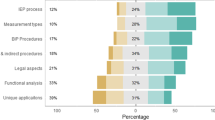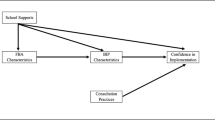Abstract
Schools across the nation have been charged with the task of conducting functional behavioral assessments (FBAs) to aid in the development of behavior intervention plans (BIPs) to address the challenging behavior of students with special education needs. In response, schools have initiated efforts to provide the various members of their student services and individualized education program (IEP) teams with the knowledge and training to insure compliance with the federal mandate. The current study examines the FBAs and BIPs developed by school teams across one state with regards to ‘best practices’ and the requirements identified in recent litigation. Following a state-wide training effort, service team members from school districts across Wisconsin were encouraged to submit completed FBA/BIPs for a critical review (whether or not they had participated in the training). Findings suggest that the majority of the FBAs submitted displayed serious flaws. The most common problem resulted from a lack of clarity in the identification and operational definition of the target behavior or behaviors under investigation. There was a general failure to identify any effort taken by the team members to verify the hypothesized function of the behavior before attempting intervention. Perhaps most alarmingly, a significant number of the teams did not appear to take the function of the behavior identified in the FBA into consideration when developing the BIP. Teams that included members who had completed two or more days of intensive in-service education related to FBA/BIP development were found to produce better results. Readers are provided a simplified checklist for use in reviewing their own FBA/BIPs.
Similar content being viewed by others
References
Alberto, P., & Troutman, A. C. (1998). Applied Behavior Analysis for Teachers 5th ed. Upper Saddle, NJ: Prentice-Hall.
Bock, S. J., Savner, J. L., & Tapscott, K. E. (1998). Suspension and expulsion: Effective management for students? Intervention in School and Clinic, 34(1), 50–52.
Carr, J. E., & Wilder, D. A. (1997). Functional assessment and intervention: A guide to understand problem behavior. Homewood, IL: High Tide Press.
Conroy, M., Katsiyannis, A., Clark, D., Gable, R. A., & Fox, J. M. (2002). State Office of Education Practices: Implementing the IDEA disciplinary provisions. Behavioral Disorders, 27(2), 98–108.
Dunlap, G. (1993). Functional analysis of classroom variables for students with emotional and behavioral disorders. Behavioral Disorders, 18(4), 275–291.
Durrand V. M., & Crimmins, D. B. (1996). The Motivation assessment scale. Topeka, KS: Monaco & Associates.
Gable, R. A. (1999). Functional assessment in the school settings. Behavioral Disorders, 24(3), 246–248.
Gable, R. A., & Hendrickson, J. M. (2000). Strategies for maintaining positive behavior change stemming from functional behavioral assessment in schools. Education and Treatment of Children, 23(3), 286–297.
Gable, R. A., Hendrickson, J. M., & Smith C. J. (1999). Changing discipline policies and practices: Finding a place for functional behavioral assessment in schools. Preventing School Failure, 43(4), 167–170.
Gable, R. A., Hendrickson, J. M., Tonelson, S. W., & Van Acker, R. (2002). Increasing academic and non-academic instruction for students with emotional disorders. Education and Treatment of Children, 25(4), 459–475.
Green, P. (2001). Demographic shifts and educational challenges in the 21st century. School Business Affairs, 67(4), 25–31, 51.
Gresham, F. M. (1991). Conceptualizing behavior disorders in terms of resistance to intervention. School Psychology Review, 20(1), 23–36.
Gresham, F. M., Quinn, M. M., & Restori, A. (1999). Methodological issues in functional analysis: Generalizability to other disability groups. Behavioral Disorders, 24(2), 180–182.
Heckman, K., Conroy, M., Fox, J., & Chiat, A. (2000). Functional assessment-based intervention research on students with or at-risk for emotional and behavioral disorders in school settings. Behavioral Disorders, 25(3), 196–210.
Hendrickson, J. M., Gable, R. A., Conroy, M. A., Fox, J., & Smith, C. J. (1999). Behavioral problems in schools: Ways to encourage functional behavioral assessment (FBA) of discipline-evoking behavior of students with emotional and behavioral disorders (EBD). Education and Treatment of Children, 22(3), 280–290.
Iwata, B. A. (1995). Functional Analysis Screening Tool (FAST), Florida Center on Self Injury, University of Florida.
Kavale, K. A., & Forness, S. R. (1996). Social skills deficits and learning disabilities: A meta-analysis. Journal of Learning Disabilities, 29(3), 226–237.
Liaupsin, C. J., Scott, T. M., & Nelson, C. M. (2000). Functional behavioral assessment: An interactive training module (2nd edition. Longmont, CO: Sopris West.
McConnell-Fad, M., Patton, J. R., & Palloway, E. A. (1998). Behavioral Intervention Planning. Austin, TX: Pro-Ed.
Nelson, J. R., Roberts, M. L., Mathur, S. R., & Rutherford, R.B., Jr. (1999). Has public policy exceeded our knowledge base? A review of the functional behavioral assessment literature. Behavioral Disorders, 24(2), 169–179.
Nelson, C. M., Scott, T. M., & Polsgrove, L. (1999). Perspective on educational/behavioral disorders: Assumptions and their implications for educational and treatment. In L. M. Bullock and R. A. Gable (Eds.), Third CCBD Mini-Library Series—What works for children and youth with E/BD: Linking yesterday and today with tomorrow? Reston, VA: International Council for Exceptional Children.
Quinn, M. M., Gable, R. A., Fox, J., Rutherford, R. B., Jr., Van Acker, R., & Conroy, M. (2001). Putting quality functional assessment into practice in schools: A research agenda on behalf of E/BD students. Education and Treatment of Children, 24(3), 261–275.
Quinn, M. M., Gable, R. A., Fox, J., Van Acker, R., & Conroy, M. (2001). Putting quality functional assessment into practice in schools: A research agenda on behalf of E/BD students. Education and Treatment of Children, 24(3), 261–275.
Repp, A. C. & Horner, R. H. (1999). Functional analysis of problem behavior: From effective assessment to effective support. Belmont, CA: Wadsworth Publishing.
Reynolds, C. R., & Kamphaus, R. W. (1992). The behavior assessment system for children. Circle Plains, MN: American Guidance Service.
Scott, T. M., & Nelson, C. M. (1999). Functional behavioral assessment: Implications for training and staff development. Behavioral Disorders, 24(3), 249–252.
Shores, R. E., & Wehby, J. H. (1999). Analyzing the classroom social behavior of students with EBD. Behavioral Disorders, 7(4), 194–199.
Siegel, S. (1956). Nonparametric statistics for the behavioral sciences. New York: McGraw-Hill Book Company.
Skiba, R. J. (2002). Special education and school discipline: A precarious balance. Behavioral Disorders, 27(2), 81–97.
Sugai, G., Horner, R. H., & Sprauge, J. R. (1999). Functional-assessment-based behavior support planning: Research to practice to research. Behavioral Disorders, 24(3), 253–257.
Walker, H. M., & Sprauge, J. R. (1999). Longitudinal research and functional behavioral assessment issues. Behavioral Disorders, 24(4), 335–337.
Willis, T. J., LaVigna, G. W., & Donnellan, A. M. (1993). The behavior assessment guide. Greenville, SC: The Institute for Applied Behavior Analysis.
Yell, M. L., & Shriner, J. G. (1998). The Discipline of students with disabilities: Requirements of the IDEA amendments of 1997. Education and Treatment of Children, 21(3), 246–257.
Author information
Authors and Affiliations
Rights and permissions
About this article
Cite this article
Van Acker, R., Boreson, L., Gable, R.A. et al. Are we on the Right Course? Lessons Learned about Current FBA/BIP Practices in Schools. J Behav Educ 14, 35–56 (2005). https://doi.org/10.1007/s10864-005-0960-5
Issue Date:
DOI: https://doi.org/10.1007/s10864-005-0960-5




